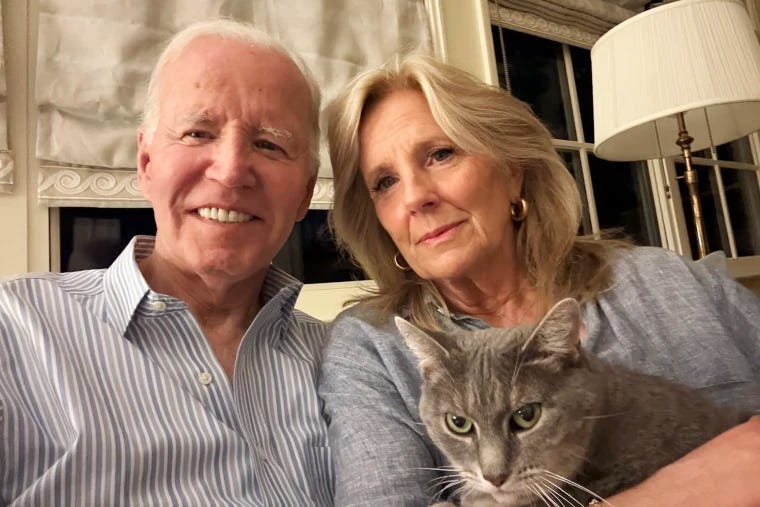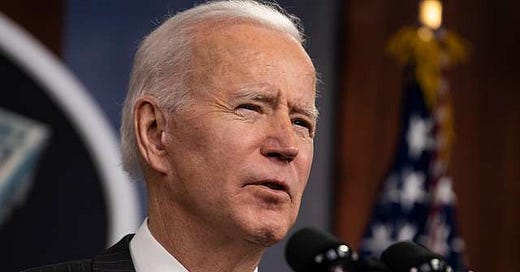What Joe Biden's cancer diagnosis means for the rest of us
Processing and the hard conversations we need to have
Dear Reader,
Thank you for being here. If you’re new to this space, a big welcome to you.
This isn’t the piece I had planned to write and share this week. But once I heard the news about Joe Biden’s aggressive prostate cancer diagnosis, I knew I’d be writing about it.
Maybe you don’t want to read yet another article about this news, considering there’ll be a ton of them written by the time you read my ramble. But as someone who’s heard those words, you have cancer, and as someone who’s watched her mother die from metastatic breast cancer, my take is different and might be of interest. You decide.
Another incentive for writing this piece came after reading a compelling Note from my friend about the dire need for us to have an honest conversation about cancer, specifically, stage 4 cancer. I’ve known Alene for years. She was an oncology nurse for 13 years and brings that experience into the conversation.
I look forward to reading YOUR reaction to the news about the former president. I’d love to know what helps YOU process difficult medical news, if you’ve been on the receiving end of it—or if a loved one has.
And those hard conversations we need to have—let’s begin one here.
What Joe Biden’s cancer diagnosis means for the rest of us
Processing and the hard conversations we need to have
When someone hears those words, you have cancer, her world is turned up-side-down, in more ways than one. As is her family’s. I won’t say a cancer diagnosis is necessarily the most horrible thing any person can experience, medically speaking or otherwise, but it’s right up there, that’s for sure.
The ‘C’ word still strikes fear into hearts and minds of all who are diagnosed with it, those whose loved ones are, and even for the general public.
Immediately upon hearing about Biden’s aggressive prostate cancer diagnosis, memories of my own diagnosis resurfaced. As my friend Beth Gainer writes about in a recent piece, this trigger effect is common in Cancer Land. My first reaction was, oh no. The man won’t get a chance now to live out his life in peace and quiet and relatively good health post-presidency.
Can we talk about former President Joe Biden without being political?
Maybe. Maybe not. It’s actually hard not to since the man’s been in politics for 50+ years. And considering the way he went out. And because of who presently sits in the White House partly because of the way he went out.
It feels mean-spirited to criticize Biden at this time, and how each news outlet and each person chooses to handle this aspect, is up to them. Even before this news broke, the new book (not going to mention the title or authors) and recent audio revelations (you know the ones) just made me feel weary.
I mean, when is enough, enough?
Joe Biden is no longer president. At this point, that other guy is the one we need to keep scrutinizing, not Biden. The obsession to look back and find blame feels like such a waste of time when we should be focusing on the here and now. Our democracy is unraveling right before our eyes.
Can we please stop being distracted?
It reminds me of the blame game that often happens in Cancer Land. Pointless.
Having said this, I’ve never been a huge supporter of Joe Biden, politcially speaking. More like an average one. What I do have is tremendous respect for him as a human being and because he was a president who cared about people and tried to do right by them. Plus, he accomplished a lot. So as a fellow human being, and now as a fellow Cancer Haver, I support him full throttle.
Why have I remained an “average” supporter from the politics angle?
I’ve never fully forgiven him for his comment after Hillary Clinton lost in 2016 that went something along the lines of, I could’ve beaten him. Plus, there’s the Clarence Thomas/Anita Hill thing.
Did I vote for Biden in 2020? You bet I did. Proudly. He’s a good man. His opponent wasn’t/isn’t. For me, it’s that simple when I step into the voting booth. Good moral character always matters more to me than anything else. Period. Why this is even debatable, I will never understand.
And now, a few of those hard conversations we need to have…
Diagnosis
I am not a medical expert of any sort. I don’t know much about prostate cancer. However, I do know it’s rarely diagnosed at such a late stage as Biden’s was. Prostate cancer is generally slow growing. It likely has been in his body for quite some time.
1) Does the late diagnosis in Biden’s case raise questions about prior medical care he received, decisions made, most importantly for the rest of us, screening guidelines in general?
Absolutely. We need to keep in mind that screening guidelines are not a one-size-fits-all. (Same deal for mammograms) It’s been reported that Biden’s last PSA screening test for prostate cancer was in 2014. He was already past the age for which this type of screening is recommended. Recommended screeening guidelines perhaps need a revisit.
Treatment
This is where things get even more challenging for families with a loved one diagnosed with cancer. We’ve been hearing there are good treatments available now (thanks to RESEARCH!) for Biden’s particular kind of cancer. His is hormone driven, making it more treatable, which obviously, is very good news.
We’ll have to wait and see what he and his family decide regarding those options and their choices.
2) The fact that Biden’s cancer has already metastasized changes the conversation.
Why?
Because how we talk about stage 4 cancer matters. It starts with using the words—stage 4 or metastatic cancer—scary words, yes, but it’s okay to use them.
I’m glad the media made it clear right away that Biden has stage 4 cancer. This isn’t always the case, especially when celebrities and other well-known people are diagnosed stage 4. I get it. It’s hard to grapple with what stage 4 means. But grapple with it, we must. Again, I’m not just talking about in Biden’s case.
3) Once a cancer reaches stage 4, it’s not curable. Treatable, yes. Curable, no. And this is a biggie:
No cancer patient will beat cancer merely by fighting hard and staying positive. And yet, this is the advice cancer patients probably hear most often.
This is not to say staying positive and fighting hard do not matter. Of course, they do. But cancer outcome is not determined by how hard you fight or how much smiling you do. Cancer isn’t an opponent in some war game you can stomp out with mindset or determination. And a positive attiude—not always doable. Cancer patients don’t need the added pressure to always fight and always stay positive. What does that even mean anyway? It sounds exhausting because it is.
4) Wishing someone a speedy recovery from stage 4 cancer, though well-intended, is just not realistic. Or helpful.
Speedy recovery from stage 4 cancer? Umm, not gonna happen. This doesn’t mean someone can’t live for years with a stage 4 diagnosis, but recovery—again, not happening. Yes, Biden’s been through a lot in his life. Sure he’s always been a fighter. But stage 4 cancer is a different beast.
That’s why some of the well wishes coming in for Biden (yes, even the one from former VP Harris) grated on my nerves a bit.
Or is just me? (Let me know.)
5) Expecting all stage 4 patients to choose the most aggressive treatment path available, isn’t realistic, fair, or even always doable.
Sometimes, the most aggressive plan does make the most sense. (It’s the one I chose.) Other times, palliative care (not the same as hospice), combined with or without cancer treatment, is the best course to follow. There’s nothing written in stone that says a person must choose the most aggressive treatment available to them. Overtreatment happens, doesn’t always extend life, and often decreases quality. Sometimes, less treatment (in some cases, even none at all), again, coupled with palliative care, leads to better quality time left to spend with loved ones.
These are hard things to internalize—hard realities to contemplate, much less accept.
My mother underwent chemotherapy as a last resort, and to this day, I regret my part in making the decision to put her through that, considering the point at which her cancer progression/prognosis was. Of course, we all know what they say about hindsight.
I am not suggesting what Joe Biden and his family should or should not do about any of this. I would never do that.
These things are just important pieces of the conversation that now presents itself and is worthy of being had.
Every cancer is different. Every cancer patient’s body reacts differently to the cancer and to treatment. And sadly, not everyone has equal access to high-quality care. This is why generalities should be avoided. This is why judgment from outsiders is rarely accurate or helpful.
6) Those annoying platitudes—don’t get me started—they are mostly useless.
Saying things like: God only gives you what you can handle, everything happens for a reason, you’re such a fighter/you’re so strong/you’ll beat this, and so on, for the most part, is unhelpful. And often hurtful.
Read more about the unspoken half of those platitudes HERE.
Processing
Once a person receives a cancer diagnosis, the processing begins and never really ends. My heart hurts that another family has been catapulted into the chaos of uncertainty that a cancer diagnosis brings.
Processing is an important part of the cancer experience. Processing helps you regain your footing, avoid information overload, devise a plan, accept your new reality, and just keep going. We all do this processing differently, too. There’s no right or wrong way.
Only Joe Biden and his family have access to all the medical information gathered thus far. As they process, they will figure out what matters most to them—what their goals for treatment are hinges on that. No matter what they decide, the media and countless others will scrutinize and pass judgment. Hopefully, the Bidens can tune most of that noise out. Maybe some of us should as well.
Ultimately, decisions for what to do next are Joe Biden’s to make. Let’s give him the space to make them. Cancer is hard enough when it’s just your family and friends watching. Having the whole world watch, is hard to even imagine.
It’s my hope that journalists, the GOP—all of us—can find our common humanity and remember this isn’t just an unfolding news story we’re talking about. It’s the life of a good man.
Politics aside, I know you join me in sending caring wishes to Joe Biden and his family as they process these hard things and figure out where to go from here.

These hard conversations are worth having—even if you’ve never had to yet go through this sort of processing and decision making—perhaps especially if that’s the case.
I look forward to your thoughts.
Let’s have a conversation.
What helps/helped you process difficult medical news you (or your loved one) received?
Do you think comments like, you’re such a fighter, you’ve got this, and the like are helpful?
What matters, mattered, or would matter most to you when choosing a treatment plan for any serious condition or illness?
If you feel these hard conversations are worth having too, thank you for restacking my essay.
Clicking on the little heart button at the beginning or end of this aritcle is appreciated as well as it helps more readers discover it.
Paid subscriptions not your thing, but you’d still love to offer financial support for this article? The PayPal Me option might suit you. One time, any amount. Always appreciated.
Thank you for reading and being part of this important discussion. I appreciate you.
As always, I see you. I hear you, and I care about what you have to say.
Until next time…
Take care of yourself, be kind to someone, and be a light.
With much gratitude,
Nancy
P.S. If you’re interested in reading a sample of my memoir, Cancer Was Not a Gift & It Didn’t Make Me a Better Person, click here to download the beginning pages.







There’s a line in your piece that really stayed with me: "Every cancer is different. Every cancer patient’s body reacts differently to the cancer and to treatment."
It seems so simple, yet it's a profound reminder that we must resist the urge to generalize. We often look for patterns, for predictability, but cancer defies such categorization. Each journey is unique, each body responds in its own way, and each person's path will be distinct.
This underscores the importance of individualized care, both medical and emotional. It reminds us to listen, to truly listen, to the person in front of us and their unique experience. It’s a call for empathy over assumption, for understanding over judgment. How often do we forget to take this simple wisdom into other areas of our lives?
It’s mind-boggling to me that Joe Biden has been inundated with such criticism in learning that he has metastatic cancer. Biden is one of the most empathetic people you’ll find. He deserves empathy in return.